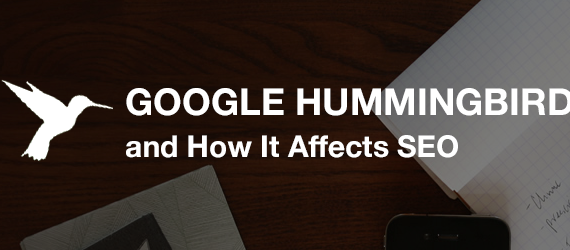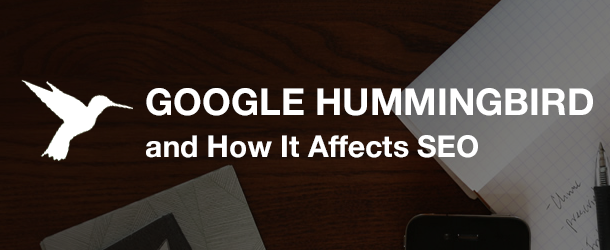
The influence of Google Hummingbird Algorithm on SEO
Category : Talk To Our SEO Experts
Matt Cutts said that the Hummingbird algorithm actually effects 90% of all searches but he said only to a small degree. So while Panda may have impacted 10% or so and Penguin closer to 3% or so, Hummingbird impacted 90%. But Matt Cutts said only to a small degree where users should not notice.
How does Hummingbird work?
Well in short it’s faster and more precise than previous versions of Google.
One of the deepest changes that makes Hummingbird so different than past versions of the Google algorithm is that it now focuses more on conversational search. Google has said that less people are searching seriously with short keyword terms and focusing more on the longer tail keyword searches asking for multiple data points simultaneously.
This means Google is ultimately looking less at what each keyword in your query means and more at what your entire query means.
What Does Google Hummingbird Enhance?
In my opinion the Google Hummingbird change signals three pretty clear objectives for Google.
- Google wants to communicate conversationally.
- Google wants to deliver a seamless experience across all devices.
- Google wants to anticipate your needs and answer your questions before you have them (they want to be your assistant).
Let’s break these down one by one.
- Google wants to communicate conversationally– When search engines started the only way we could interact with a search engine was by keyboard. At that time the search engines operated by looking for keywords and that was pretty much what you would enter into the search. For example if you think about the video above Matt Cutts wants to know how fast a cheetah can run. Instead of searching for, “how fast does a cheetah run?” he searches for, “cheetah running speed.” So in the early days of search we stripped out unnecessary words from our search queries to make it easier for the user to search. Why would Google want to change this? Because today more searchers are using their mobile devices and the big difference is that you can actually speak to your mobile device. That brings us to the next point.
- Google wants to deliver a seamless experience across all devices– As we have already discussed users are searching more frequently from a mobile device. As a result Google has made some strategic changes make sure that users can have a seamless experience whenever they access the web. For example the Google web browser Google Chrome now works on mobile devices. This means where ever you surf the web on any device if you are logged into Google Chrome Google can present personalized search results to you. You can also access your bookmarks, and browsing history seamlessly across all devices. Google is also working hard to enhance the Google Now app. Which brings us to our final point.
- Google wants to be your assistant- Google Now is much more than a search app. Google now starts to get to know you and learns about your activity. When I wake up every morning Google Now tells me how many minutes it will take me to drive to the gym. Google Now also has access to my calendar, contacts, location… almost anything I tell my phone. Because of that Google Now reminds me of deadlines, birthdays, places I have visited, and things I have searched for. Ultimately Google wants the Google Now app to act like the Star Trek Computer. They want you to be able to say, “OK Google” and have Google assist you with any task you can think of. I know I’ve shared this video before but it is the ultimate example of what Google wants Google Now to be.

The implications of a Hummingbird search world
It is important to remember that this step forward being described by Google as a new platform.
Like the Caffeine release Google did in June of 2010, the real import of this is yet to come. Google will be able to implement many more capabilities in the future. The implications to search in the long term are potentially huge.
For you as a publisher, the implications are more straightforward. Here are a few things to think about:
1. Will keywords go away?
Not entirely. The language you use is a key part of a semantic analysis of your content.
Hopefully, you abandoned the idea of using the same phrases over and over again in your content a long time ago. It will remain wise to have a straightforward definition of what the page is about in the page title.
I’ll elaborate a bit more on this in point 3 below.
2. Will Google make the long tail of search go away?
Not really. Some of the aspects that trigger long tail type search results may actually be inferred by Google rather than contained in the query. Or they may be in the user’s query itself. Some long tail user queries may also get distilled down to a simpler head term.
There will definitely be shifts here, but the exact path this will take is hard to project. In the long term though, the long tail will be defined by long tail human desires and needs, not keyword strings.
The language you use still matters, because it helps you communicate to users and Google what needs and desires you answer.
3. You need to understand your prospect’s possible intents
That is what Google is trying to do. They are trying to understand the human need, and provide that person with what they need.
Over time, users will be retrained to avoid short simple keyword-ese type queries and just say what they want. Note that this evolution is not likely to be rapid, as Google still has a long way to go still!
As a publisher, you should focus more attention on building pages for each of the different basic needs and intentions of the potential customers for your products and services. Start mapping those needs and use cases and design your site’s architecture, content, and use of language to address those.
In other words, know your audience. Doing this really well takes work, but it starts with knowing your potential customers or clients and why they might buy what you have to sell, and identifying the information they need first.
4. Semantic relevance is the new king
We used to speak about content being king, and that in some sense is still true, but it is becoming more complex than that now.
You now need to think about content that truly addresses specific wants and needs. Does your content communicate relevance to a specific want or need?
In addition, you can’t overlook the need to communicate your overall authority in a specific topic area. Do you answer the need better than anyone else?
While much of being seen as an authority involves other signals such as links, and perhaps some weight related to social shares and interaction, it also involves creating in-depth content that does more than scratch the surface of a need.
Read more The important knowledges of Google Hummingbird Algorithm
_______________________________________________________________________________
Please contact us for seo service packages at TDHSEO.COM.
TDHSEO Team
Email: tdhseo@gmail.com
Skype: tdhseo
https://www.facebook.com/tdhseo
Thank you!